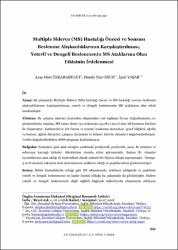Multiple Skleroz (MS) Hastalığı Öncesi ve Sonrası Beslenme Alışkanlıklarının Karşılaştırılması, Yeterli ve Dengeli Beslenmenin MS Ataklarına Olan Etkisinin İrdelenmesi
Abstract
Amaç: Bu çalışmada Multiple Skleroz (MS) hastalığı öncesi ve MS hastalığı sonrası beslenme alışkanlıklarının karşılaştırılması, yeterli ve dengeli beslenmenin MS ataklarına olan etkisi incelenmiştir. Yöntem: Bu çalışma internet üzerinden oluşturulan veri toplama formu doğrultusunda yer gözetmeksizin ulaşılan, MS tanısı almış yaş ortalaması 34,08±7,93 yıl olan 98 hastanın katılımı ile oluşmuştur. Katılımcıların MS öncesi ve sonrası beslenme durumları, genel bilgileri, ağırlık ve boyları, eğitim düzeyleri, çalışma durumları ve fiziksel aktivite düzeyleri değerlendirilmiştir. Veriler değerlendirilirken SPSS programı kullanılmıştır. Bulgular: Sonuçlara göre atak sıklığını azaltmada probiyotik, prebiyotik, posa, B1 vitamini ve selenyum kaynağı ürünleri tüketiminin olumlu etkisi gözlenmiştir. Sadece B1 vitamini kaynaklarının atak sıklığı ile istatistiksel olarak anlamlı bir ilişkisi olduğu saptanmıştır. Omega3 ve D vitamini takviyesi alım durumlarının atakların sıklığı ve çeşidine etkisi gözlenmemiştir. Sonuç: Bütün hastalıklarda olduğu gibi MS oluşumunda, atakların sıklığında ve çeşidinde yeterli ve dengeli beslenmenin ne kadar önemli olduğu bu çalışmada da görülmüştür. Sadece yeterli ve dengeli beslenmenin değil sağlıklı bağırsak mikrobiyota oluşumunu etkileyen probiyotik, prebiyotik ürünlerin, posanın, fonksiyonel besinlerin de antioksidan özelliklerinden dolayı mutlaka tüketilmesi gerekmektedir. Aim: In this study, we compared the nutritional habits of before and after MS and the effect of adequate and balanced nutrition on MS attacks was investigated. Method: This study was conducted in accordance with the data collection form on the internet without the place. It was formed with the participation of 98 patients diagnosed with MS and the mean age was 34.08 ± 7.93 years. Nutritional status of before and after MS, general information, anthropometric measurements, educational level, working status and physical activity levels of the participants were evaluated. SPSS program was used to evaluate the data. Findings: According to the results, positive effects of consumption of probiotic, prebiotic, fiber, vitamin B1 and selenium source products were observed in decreasing attack frequency. It was found that only vitamin B1 sources had a statistically significant relationship with the frequency of attacks. The effects of supplementation of Omega-3 and vitamin D on the frequency and type of attacks were not observed. Conclusion: In this study, the importance of adequate and balanced nutrition on MS formation, frequency and variety of attacks has seen, as in all diseases. Not just adequate and balanced nutrition, but also probiotic, prebiotic products, fiber and functional foods that affect the formation of healthy intestinal microbiota should be consumed due to their antioxidant properties.
Issue
6Collections
The following license files are associated with this item:


















